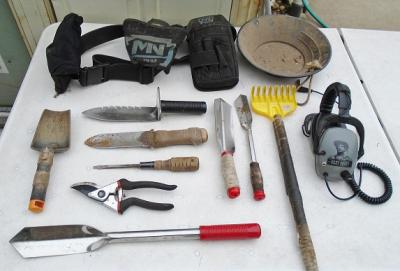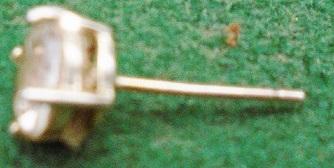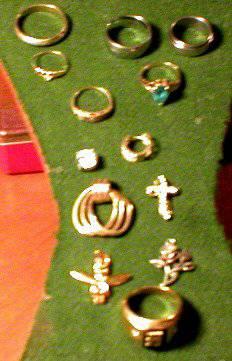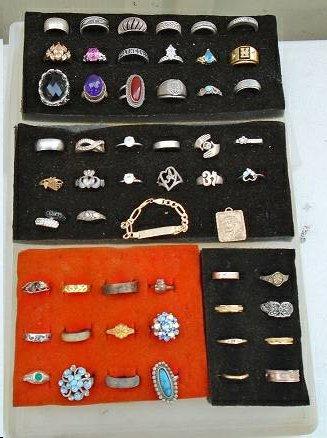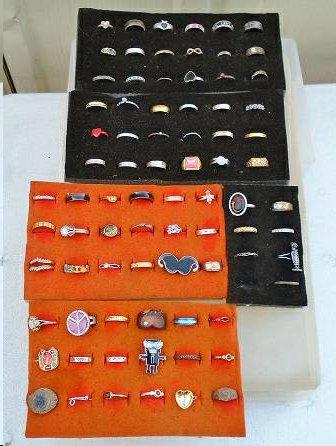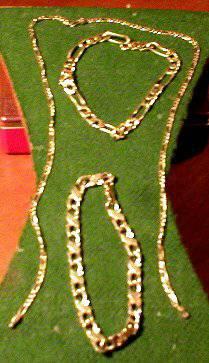-
Posts
24 -
Joined
-
Last visited
-
Days Won
1
Content Type
Forums
Detector Prospector Home
Detector Database
Downloads
Everything posted by plidn1
-
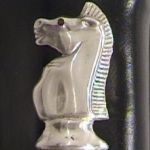
** Lost Gold At The Dead Man's Mine ** A Miners Journal **
plidn1 replied to GhostMiner's topic in Detector Prospector Forum
An Ol' Tin Cup (and a Battered Ol' Coffee Pot) - YouTube -

I Am Having To Do A Complete Reset
plidn1 replied to Mike Hillis's topic in Metal Detecting For Jewelry
Only 2 pieces of gold here and not many more silver. Lots of bling, but a very poor showing on the better jewelry. -
A lot of gold is mixed with copper to get the rose color. If you pass on pennies, you're leaving gold in the ground.
-
The easiest way to tell if it's gold in the pan is add a little mercury to the mix. If the merc. picks it up, you have gold. If it doesn't, throw it all out. You could also add a little nitric acid to the concentrates and let it soke.
-

VLF Concentric Vs DD Coils
plidn1 replied to Steve Herschbach's topic in Metal Detector Advice & Comparisons
When I get serious about finding value targets, or I am hunting a place for the first time, I grab my 6 1/2" concentric to hunt with. Nothing I have owned or used has yet to out perform it. -

VLF Concentric Vs DD Coils
plidn1 replied to Steve Herschbach's topic in Metal Detector Advice & Comparisons
My hunting partner just sent me this. Capabilities of a Small Coil by Reg Sniff, Lost Treasure Magazine -

VLF Concentric Vs DD Coils
plidn1 replied to Steve Herschbach's topic in Metal Detector Advice & Comparisons
The big problem now days, the MFG's don't want to build many concentric coils so in order to get different size coils, you are forced into buying DD's. It really cuts down on how you can utilize your detector. Even with aftermarket coils, the choices are very limited. The right coil for the right situation, can make or break a detector. Coils can make a good detector, a great detector. -

VLF Concentric Vs DD Coils
plidn1 replied to Steve Herschbach's topic in Metal Detector Advice & Comparisons
This is my opinion of DD vs Consentrics from field use. People have the impression that DD coils eliminate masking. They do not. Often times they are vulnerable more so to masking then a concentric. Another misconception of DD coils is that they are better in hot ground. This is a maybe. If you are using a small DD it can help. But in the same ground, using a small concentric will work as good if not better. In order to compensate in the depth loss of a DD vs a concentric, you have to go to a larger DD coil. When you do this you are now reading more ground increasing the problem with hot ground. By going to a larger coil, you also increase the problem of masking. Larger coils also have the tendency of ignoring smaller objects. Using a DD also decreases your ability to pin point and discriminate. Most VLF detectors derive their best performance from a 6" to 7" coil on coin and jewelry type targets, in most hunting situations, at moderate depths. Smaller targets, such as small gold need smaller coils to see it. All other size and type coils, larger or smaller, are designed for nitch hunting situations. These are special applications for your hunting style or area conditions. Use of these coils create trade offs in performance in many different ways. -

Headphones And Digging Tools
plidn1 replied to quinton's topic in Metal Detecting For Coins & Relics
99% of my hunting is in urban parks and school yards. ON the grass. These are the tools I use. The plastic rake is for tot lots with wood chips. The Rose clippers are far better for clearing away smaller tree roots. The 10" plastic gold pan is for the removed dirt from below the root line of the grass. It keeps all the dirt in one place and is easy to replace back in the hole. Using Hocky tape on the handles of your diggers will keep your hands from sliding up the handle in wet grass. If a plug is dug and replaced properly no one will ever know you were there unless they see you. You will never lose a target this way. Think of yourself as a professional gardener. -
Your detector is only a tool. Having a detector that does everything but shine your shoes is great. But it will only do half the job. You have to train your mind to focus every minute of the day to find treasure. So many times I have been out and about and found valuable jewelry just laying on the ground. You would not believe how many times I have found an item of value before the detector is close to it. Here is an example: I was once hunting a tot on a cold, drizzly, day and the wind was blowing about 35 mph. I glanced over at the sand box and it was smooth as glass. Then I realized in the middle laying on top of the sand, was a long, 14 K gold chain, like someone had layed it out in a straight line for me to find. The strange thing was, it took a minute or so to realize what I was looking at. Because I had let my mind get lazy and focused on only what the detector found and not what I was looking for. If your mind does not recognize what you are looking at, you lose. How many times do you look for something that is in plain sight but you don't see it? There are many ways to keep your mind focused for treasure. On rainy days check around the drains in the parking lots or check along the fence lines on windy days. These are just a couple of exercises you can do to stay sharp. I am always looking for what is on the ground every where I go. It just amazes me how many times I do find items of value. Not every day is a payday, but if you're in the right frame of mind, you can bring them closer together.
-
If you watch where the players take off their ball gloves you will find a rich area. Base lines are good and places where the out fielders tend to take their glove off comming in at the end of an inning. The action of pulling the glove off produces more rings then the actual throwing of the ball.
-
That's the first I have heard of that one. I'll have to see what I can dig up.
-
In case you didn't know, Dr Todd was, Mary Todd's brother. She was Abraham Lincoln's wife. The original town of Todd's Valley was on the north west corner of the first cross road from the corner of where the dump road turns off the main road just passed the property. There was a small ranch there at one time. It was the only thing left that I remember to mark the site. Where the old foundation was of Dr Todd's cabin, up the hill behind it was an old hard rock mine. It was still open the last time I was there. My cousin used to get mad at my grand father for going into it and chipping out the quartz. It was full of large quartz crystals. I think my cousin was actually working that mine, but he never told anyone if he was.
-
The old barn was the original WF barn. We used to play in it when kids. It was split in two and one side was for Tac the other was a store way back when. When the barn finially fell down, a new one was built over the old. I didn't know this before the new barn was built. I would have loved to have detected that old floor. A lot of stories about that place. It is very interesting. It was my favorite place to run away too when the city started to get me down. I have been up there a couple of times and have never seen anyone around. I would love to walk the grounds for the memories. I may just take a chance. P.S. After a rain storm, my grandfather and uncle used to walk the road into the place and pick up small nuggets!!!
-
You probably new my god father. Erman. Every one did. The property is located on the right of the cornor of the road that goes to the dump. Last time I was up there about a year ago, they started to subdivide and looks like they stopped. Made me sick to see it that way. I know the area very well and it's history. The property boarders Todd Valley estates.
-
That's a sad story. That is one of the strongest leads I have heard in a long time. And nothing being done about it. That would drive me NUTS.
-
This is a post I made on another forum that got a lot of attention. I condensed it for this posting. This is something everyone should be thinking about while out swinging a detector. Back in the 80's I had a close friend and working associate come to me and ask if I still had a metal detector. I told him yes and this story started to unfold. My friend was in a business where he made LOTS of money under the table. So in order to hide it, he was buying gold and silver coins and hiding it under his house. He told no one about, it not even his wife. He had buried the coins in containers and ran a wire with a flag to the surface so he could find them. Then one day he had a massive heart attack. When he recovered, he got scared and went under the house to dig up his hoard. He almost had another heart attack when he found that his wires had rusted away and he had no idea where the coins were. He told me he had dug many of them up but several ozs of both gold and silver were lost. This is where I came into the picture. I was working some very long hours and didn't get a chance to get over there right away. Some time passed and he sold the house. A few years later he passed. This house is not to far from me in a nice neighborhood. I drive by there every once in a while and wonder just how much gold and silver is still there. But then I just have to wonder how many other banks are in the neighborhood. I have an Aunt, that to this day, refuses to use a bank, and her money is hidden in her basement. My second wife's grand parents owned motels in Oregon. When they died, many thousands of dollars was found hidden all over their house. It was stuffed everywhere you could think of. They never did know if they found it all. Back in the 80's I used to research train robberies. One turned out to be practically in my back yard. We narrowed it to a 5 acre piece of ground. I tried to buy the property but the guy wouldn't sell. It has now been sold and as far as I know the 20 pound sack of $20 gold pieces is still buried there. Most "post hole banks", private party banks, are not buried deep and generally in plain sight of the person who buried it. For the simple reason that they may want to add or take away some amount without a lot of effort, and would be able to keep an eye on the spot. The area I grew up in was once owned by a large family that moved here in the late 1920's. I grew up with some of the great grand kids. The property, originally a section, got divided over the years and given to siblings. Some was sold off like the parcel my folks bought. I have been told that several of the old timers had buried money in the neighborhood. A lot of it has since been found. Maybe all of it. But then again who knows. I had an Uncle who has passed on, he buried several oz's. of gold and silver slugs in round containers in his back yard in the 1980's. No one knows what happened to them. He may have dug them up and sold them, OR, they may still be there. His property is no longer in possession of family members so the access is now gone. There are a lot of these stories told around a camp fires and I think most the stories you will hear are based in fact, but the pertinent details have been lost over the years or added to thru the telling of the story. Plus all the trash that has been discarded on rural properties make's it almost impossible to perform any kind of functional hunt with a detector. Short of a chance hit with a dozer cutting a new road, most the unfound money will stay that way. Long dead now I had a cousin that had moved to Foresthill Ca. in the mid 1930's. He and my grandfather were gold miners and worked many rivers in the area and at one time had a hard rock mine they were working in the Alta area. The property he moved to was a 52 Acer piece and was once an old Wells Fargo stage stop. There were 3 mines on the property, a boarding house that he lived in, and the old barn WF used. At the back of the property was an old rock foundation in front of the only mine shaft that was still open. This was the original cabin site of Dr. Todd of Todd Valley. I used to spend a lot of time there in the 60' and 70's, but before I got into metal detecting. When we were small kids in the 50"s My cousin would love to show us his gold coins. He would not let us go into the basement with him, but would come out with several coins to show us. Now when he had closed the mine in Alta, he brought the ore crusher and a few carts to the ranch. One night he caught some neighbor druggies trying to steel the carts and ran them out at gun point. Some time later they returned and set the house on fire and burned him out. Luckily he got out of the house. Many nice antiques were lost in that fire. A few years later he Passed away leaving the property to his son, my God Father. The boarding house was a two story place with a stone basement underneath it with a big iron door. When the fire burned itself out all the rubble was in the basement. Over time, little by little my God father cleaned out the basement. One day he found 2 mason jars that were shattered and all broken up, but the glass was all held together by the melted gold that was inside them! During the 80"s I was up there playing with a detector and detected one of the walls of the basement. I found 2 different spots behind the rocks that had metal. The rocks were loose, like they could be removed. I didn't check behind them, but told my God father about them and where they were. He said he would check them. It was a year or so before I was back up there and asked about the basement. I was told that it had not been checked yet. I headed out that way and detected around the foundation where the loose rocks were, but whatever was hidden there was now gone. I never asked about it again. All the old timers are dead now and that property has been sold. But I would give my eye teeth, with the knowledge I have now, to be able to hunt that property again. I too have several thousand dollars stashed for a number of reasons. That's kind of ironic that I may become the center of a treasure story some day.
-
I found this, this morning with my M6. Marked 14 K It rang up as a pull tab and was in someone else's hole!
-
People Are Always Asking..................................... What is the best Detector To buy ? or Where can I find gold? or How do you find so much gold all the time? It's very simple. I hunt every day and I hunt in places where people have the opportunity to lose jewelry. I have a good quality detector, that is gold sensitive, and is capable of giving me lots of valuable information on what is in the ground. I have learned to understand what it is telling me and have learned it inside and out. I use the right coil for the place and conditions I am working. I use no discrimination and dig most everything that isn't iron. The detector is only a tool. Knowing how and where to use it, it's strong points, capabilities, and it's short comings is the secret. Everyone thinks they own the best detector made. I make mine the best there is. I just love it when I am told "The place is worked out". I have found more good stuff in worked out parks then any other place. I also believe, with the exception of nitch detectors, that you use only one detector. That way you learn it's values and particular language. All detectors (and coils) are different with a different language and quirks of there own. By using only one, you don't get confused and when an odd situation comes at you, you can trust your machine and learn a new lesson. When you become one with your detector, when using it becomes second nature, then you have a good one. Every day, every hunting spot is different. Something as simple as weather can change the way a detector responds to a target let alone all the other factors involved. The only way to truly over come these challenges and be successful, is to really know your tool.
-
Fred, I don't want to hi jack this thred. If you go to the whites forums and run a search for plidn1, I started a thred called "Virgen Parks Or State Of Mind". It is very interesting with a lot of information. It is about my learning to master my MXT and learn how to find jewelry. You should get a kick out of it. It is a very good read for newbes and old alike.
-
It's no different then reading a river or reading the terrain. Learning the lay of the land where you are working. This is something you have to learn on your own. This is some of the stuff I haven't scrapped. Not all is gold. Lots to find when you learn how and where to look.
-
In the late 70's and 80's I spent 12 years dredging gold. I had 6 different dredges, all the support equipment that goes with them, 2) 4x4's, 2 trail bikes, 2 quads, trailers, detectors etc. etc........................ Now we found a lot of gold, but never found the lost Dutchman, and never did pay off the investment. I now own several detectors and although I do nugget hunt on occasion, I find myself primarily a jewelry hunter. I have in the last few years, found more gold in the parks and school yards around my house then I ever did in the gold fields. I can work every day, and do, and never get out of a 5 mile radius. I need no special equipment and only need to work 2 to 3 hours a day. True I dig a lot of trash, but if you work smart, you can cut that down immensely. It's a lot less work then moving rock for a living. And as Steve remarked, Gold is Gold.
-

Fine Gold Recovery Devices for Cheap?
plidn1 replied to tvanwho's topic in Gold Panning, Sluicing, Dredging, Drywashing, Etc
When I bought my blue bowl it was called "The Dam" They don't come any better. Never want to be without one. -
Great post Steve. I am new to this forum, but not to detecting. I am primarily a jewelry hunter. I Live by the VDI numbers. They are invaluable when you hunt with 0 discrimination. The information contained in those numbers are staggering. Only many, many hours in the field will give you their full benefit. But they are still, as any type of discriminator, only a guide. There are so many variables on any given day, that nothing is written in stone. I use them more to tell me what groups of metals may be tripping the bell at that moment and what I might expect to find when I dig out the target.



